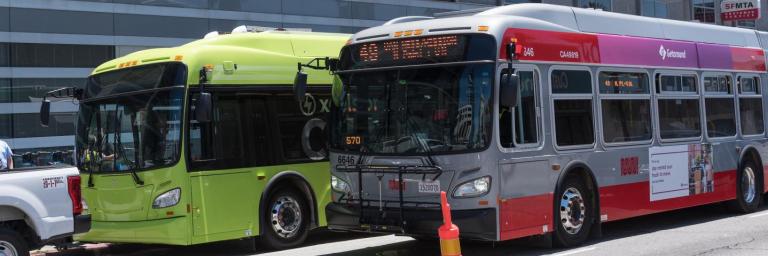The SFMTA is a global leader in supporting an environmentally sustainable transportation system. Muni operates the greenest fleet of any city in North America. More than 50 percent of our transit vehicles, including light rail, cable cars, historic streetcars and electric trolley buses, are powered by 100 percent greenhouse gas-free hydropower generated from Hetch Hetchy.
Although Muni’s fleet accounts for less than .01 percent of overall citywide emissions, the SFMTA is working towards a 100 percent zero-emission fleet as part of its leadership in confronting climate change.
On Tuesday, March 16th, 2021, the SFMTA’s Board of Directors adopted the agency’s Zero Emission Bus (ZEB) Rollout Plan, in accordance with the California Air Resource Board’s (CARB) Innovative Clean Transit regulation. We continue to update our Zero Emission Bus Rollout Plan to describe how we will transition our facilities to support a battery-electric fleet.
Project Evaluation
The SFMTA has evaluated how to bring together transitioning facilities to support an electric bus fleet with our Building Progress Program to rebuild and upgrade our most obsolete yards. Joining the two is a complex process. To transition to electric buses, our yards require needed charging infrastructure. New electrical service and grid improvements are dependent upon utility partners (SFPUC and PG&E).
Environmental Big Picture
While a zero-emissions transit fleet is important to furthering the city’s climate action goals, it does not address the city’s biggest transportation polluters -- emissions from private vehicles, which account for more than 70 percent of transportation emissions. We are using diverse strategies, identified in the City’s Transportation Sector Climate Action Strategy (2017), to encourage people to drive less and transition to zero-emission modes. Providing quality and reliable Muni service is critical to these goals.
Progress to Date
Green Zones Pilot: In 2019 SFMTA launched its green zones pilot in which buses switch off their diesel hybrid motors and change to battery power when the bus enters green zone areas (chosen through an environmental justice and equity lens). SFMTA has been evaluating how effectively the bus batteries can deliver the same standards of reliability and service.
E-Bus Program: In 2019 the SFMTA began an electric bus pilot program to evaluate bus performance, including how e-buses climb our hills and handle being in service 20-plus hours a day. Delivery of the electric buses began in May 2021. We’re now in the process of testing and installing charging infrastructure at Woods Division to accommodate them. In June of 2023, the SFMTA was awarded the Low- or No-Emission Grant for 33 million in federal funds. The grant will fund the installation of 18 electric vehicle charging stations with inverted pantographs and structural platforms at the Woods and Islais Creek bus yards. These new charging stations are a critical step in advancing San Francisco’s Zero Emission Bus Rollout Plan.
Next Steps
Due to the challenges, at this time we are proposing to update SFMTA’s next fleet procurement in 2025 to a hybrid electric procurement to better coordinate with the timing of transitioning facilities for electric buses. Based on current facilities planning, all future procurements (the next is in 2027) could be 100 percent electric buses.
We acknowledge that updating our 2025 fleet procurement is inconsistent with the SFMTA’s Zero Emission Vehicle policy. This policy has a goal of achieving a 100 percent battery-electric fleet by 2035 (and begin procuring zero-emission buses in 2025) while the state’s required deadline is 2040. Staff will evaluate the feasibility of meeting the policy’s 2035 timeframe and will consult with community groups, key stakeholders, staff, and our labor unions, who will have an opportunity to provide feedback on the next steps.
The SFMTA will be assessing facility implementation priorities, ways to accommodate more electric buses in the near term (15 more e-buses at Woods) and accelerating certain facility upgrades, including continued efforts with PG&E and SFPUC to ensure adequate power is available when needed.
